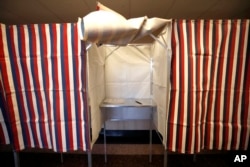As the United States moves closer to the November elections, millions of new Americans are preparing to cast their ballots for the first time.
According to the American Immigration Council (AIC), “More than 3 out of every 4 naturalization-eligible immigrants in the United States have become naturalized citizens, and in several key states, the number of immigrants likely eligible to naturalize outnumbered those states’ margins of victory in the 2020 presidential election.”
In other words, new citizens could have a big impact on the election, especially in swing states with large immigrant populations, according to the AIC.
In Arizona, new citizens who became naturalized between 2016 to 2020 totaled more than six times President Joe Biden’s margin of victory in that state four years ago.
“In many of these battleground states, the immigrant population is larger than whatever that swing vote was, so it can be very impactful both on local and national races,” Brian Miller, executive director of Nonprofit VOTE, told VOA.
Christine Chen, executive director and cofounder of Asian Pacific Islander American Vote (APIAVote), a nonpartisan nonprofit that helps mobilize Asian American voters, told VOA that when you look at the battleground states, the number of Asian and Pacific Islanders (AAPIs) who voted in 2020 outnumbered the margin of victory that year.
“When you look at the 2020 numbers, over 21% of the AAPI community were first-time voters, and the first-time voters in the general public was 14%,” Chen said. “So, we know that as a community, not only are we growing in population, but we’re becoming citizens, and we are increasing our voter registration and participation.”
Despite efforts, however, newly naturalized citizens still face obstacles in achieving voter turnout rates comparable to those born in the United States.
Joe Garcia, vice president of public policy at Chicanos Por La Causa, a nonprofit that originated in Arizona, told VOA that reaching Latinos is difficult due to several factors. Many Latinos come from households where voting was not traditionally practiced or emphasized. If their parents did not vote, there’s a high likelihood their children will not prioritize voting.
Moreover, the voting process itself can be intimidating, especially for first-time voters. The complexity of the ballot and the unfamiliarity with voting procedures can deter people from participating. This challenge is compounded by cultural and language barriers that may further alienate potential voters.
To address these obstacles, Chicanos Por La Causa employs strategies that resonate with younger Latinos, who are often more connected to digital media platforms like Instagram. They aim to engage and educate Latinos about the significance of voting and how it directly impacts issues that matter to their communities.
“It’s getting people involved and understanding that their vote matters on so many key issues — affordable housing, education, workforce development, health and human services,” Garcia said.
According to the Pew Research Center, 3.5 million immigrant eligible voters are from Mexico, more than any other country.
In the AAPI community, jobs, the economy, health care and inflation are the issues that resonate most, according to APIAVote’s survey of Asian Americans.
Chen highlighted the importance of campaigns engaging with the AAPI electorate in battleground states such as Georgia and Nevada, where the percentage of first-time AAPI voters was the highest at 26% in Georgia and 25% in Nevada.
“One thing that we’ve continued to see is that the political parties need to do a better job of reaching out to our electorate,” said Chen.
Chen said that only 54% of voters surveyed said they had been contacted by either the Democratic or Republican parties.
Biden launched an outreach campaign to Asian American voters in July after he set up coalitions focusing on Black and Latino voters.
Vice President Kamala Harris held events in Nevada and Pennsylvania and spoke at the APIAVote Presidential Town Hall July 13 in Philadelphia. An invitation to speak at the town hall was also extended to the Trump campaign.



